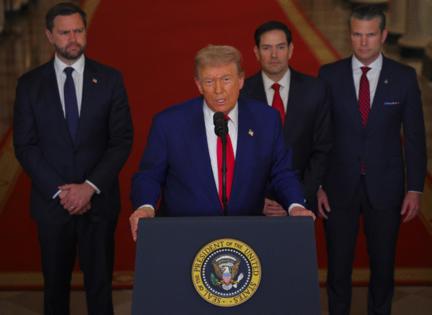Trump pressures Iran to make peace, threatening more US strikes
Published in News & Features
WASHINGTON — U.S. President Donald Trump said in an address to the nation that U.S. strikes had “completely and totally obliterated” Iran’s three main nuclear facilities, and threatened further military action if Tehran did not make peace with Israel.
“This cannot continue. There will be either peace or there will be tragedy for Iran, far greater than we have witnessed over the last eight days,” Trump said Saturday night in a three-minute speech from the White House.
“Remember, there are many targets left,” the president added. “Tonight’s was the most difficult of them all, by far, and perhaps the most lethal. But if peace does not come quickly, we will go after those other targets with precision, speed and skill.”
Trump said U.S. forces hit nuclear sites at Natanz, Fordow and Isfahan, calling the strikes “a spectacular military success.”
“Iran’s key nuclear enrichment facilities have been completely and totally obliterated,” the president said. “Iran, the bully of the Middle East, must now make peace. If they do not, future attacks will be far greater — and a lot easier.”
Trump warned Iran in a social media post shortly after his remarks that “ANY RETALIATION BY IRAN AGAINST THE UNITED STATES OF AMERICA WILL BE MET WITH FORCE FAR GREATER THAN WHAT WAS WITNESSED TONIGHT. THANK YOU! DONALD J. TRUMP, PRESIDENT OF THE UNITED STATES.”
Trump was flanked by Vice President JD Vance, Secretary of State Marco Rubio and Defense Secretary Pete Hegseth. The president said the Pentagon chief would hold a news conference Sunday to discuss the strikes further.
The attacks mark one of the most consequential decisions of Trump’s second term in the White House.
They drastically raise the stakes in a conflict that threatens to further destabilize the region and expand into a larger war in the Middle East, as Iran has threatened to retaliate if the U.S. joined Israel’s attack.
For Trump, the choice marks a turnabout for a president who won back the White House on a pledge to keep America out of foreign conflicts and derided the value of U.S. interventions in the region, namely the wars in Iraq and Afghanistan.
Trump has argued that his long-standing policy has been to prevent Iran from obtaining a nuclear weapon. He cast the U.S. military offensive as the culmination of his long-running desire to end the nation’s nuclear program, curb its threats to Israel and attacks on U.S. interests in the Middle East.
“For 40 years, Iran has been saying death to America, death to Israel. They have been killing our people, blowing off their arms, blowing off their legs, with roadside bombs,” Trump said. “I decided a long time ago that I would not let this happen, it will not continue.”
Israel has been pressing the U.S. to join its military offensive to prevent Iran from acquiring a nuclear weapon and to use its bunker-busting bombs — which Israel does not possess — to target underground nuclear facilities. Since Israel’s strikes began, the U.S. had limited its participation in the conflict to helping Israel defend itself from Iranian missile and drone launches.
Republican national security hawks, such as Sen. Lindsey Graham, amplified those calls, saying the time was right to strike Iran in its weakened state.
The strikes on Iran have exposed a schism in the Republican Party as some outspoken members of Trump’s far-right Make America Great Again movement decried the prospect of the U.S. involving itself in a foreign conflict.
Trump ally Steve Bannon, former Fox News personality Tucker Carlson and U.S. Rep. Marjorie Taylor Greene have opposed the strikes and are warning about the U.S. entangling itself in another Middle Eastern war.
“This is not our fight,” Greene posted on X.
Trump had kept the world guessing about whether he would push the U.S. into the war. He said Thursday he would make a final decision within the course of two weeks, a timeline that seemed lengthy given the quickly changing nature of the conflict.
The president suggested Friday he might act more quickly, telling reporters that “two weeks would be the maximum.” He also indicated the U.S. would not send in ground troops, saying it’s “the last thing you want to do.”
Those comments came after a nuclear talks between foreign ministers from Iran, Germany, France and the U.K., a last-ditch effort to provide Tehran an off-ramp to the escalating conflict. But the discussions in Geneva ended without a breakthrough and Iranian Foreign Minister Abbas Araghchi defiantly said he would only consider continuing talks if Israel’s attacks ended.
Iran’s Supreme Leader Ayatollah Ali Khamenei warned on Wednesday that U.S. strikes against the Islamic Republic will “result in irreparable damage for them.”
Before Israel carried out the first round of strikes last week, Trump had repeatedly said he preferred the diplomatic route and wanted to reach a new nuclear agreement with Iran.
The U.S. and Iran were scheduled to hold a sixth round of nuclear talks over the weekend, but they were canceled after Israel launched its first attack.
(María Paula Mijares Torres and Hadriana Lowenkron contributed to this report.)
©2025 Bloomberg L.P. Visit bloomberg.com. Distributed by Tribune Content Agency, LLC.







Comments